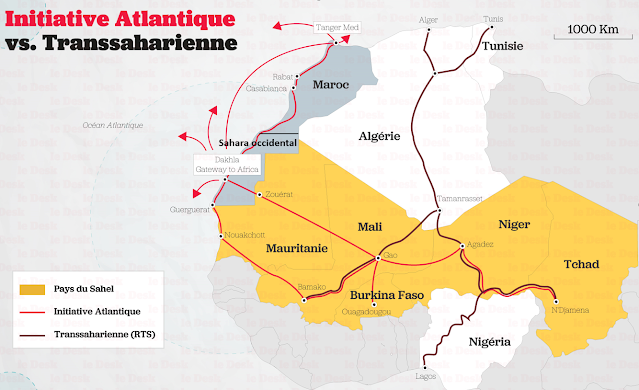Morocco persists in communicating imaginary projects to counter Algeria's concrete and operational initiatives in favor of its African depth
After the imaginary Nigeria-Morocco gas pipeline project, Morocco recently embarked on a new pipe dream entitled: access for Sahelian countries to the Atlantic Ocean.
The only thing serious about these projects, whose feasibility and financing are still unclear, are the Pharaonic means of communication used by Morocco to hammer home its fallacious and intellectually dishonest messages.
We should also note the diplomatic efforts made by the Moroccans to organize colloquia in Marrakech with African leaders of dubious morality and mediocre intellectual level, in order to present a project with vague outlines and objectives.
We can legitimately wonder why the foreign ministers of the Sahel countries decided to travel to Marrakech, as the project to give the Sahel countries access to the Atlantic is far from being an easily achievable project, as it faces a number of geopolitical, geostrategic and financial challenges:
- Was Mauritania consulted (it did not take part in the Marrakech meeting)?
- Is Mauritania running the risk of creating a diplomatic crisis with West African countries (Togo, Benin, Ghana, Côte d'Ivoire) that are already making their ports available to landlocked Sahel countries?
- What's the point of Mauritania allowing passage to the Western Sahara, when it can use its port at Nouadhibou?
- In the unlikely event that Mauritania accepts the Moroccan initiative (Mauritania recognizes the Sahrawi Arab Democratic Republic), what about the legality of this move? Western Sahara remains a territory colonized by Morocco.
- Has Morocco raised the funds to build over 7,000 km of roads in the Sahel?
- Who will pay for the $14 billion needed to build the 7,000 km of roads (this is a low estimate and does not take into account the construction of engineering structures: tunnels, bridges, etc.)?
The questions posed above make it abundantly clear that the Moroccan project is not a serious one, and is particularly unprepared. It is strangely reminiscent of the Nigeria-Morocco gas pipeline project, the feasibility study for which has not even begun due to lack of funding! As for the financing of the project, global financial institutions still don't seem to be interested, despite the Kingdom of Morocco's communication efforts.
It seems quite clear that Morocco's sole objective is to disrupt Algerian projects by giving the illusion that there are credible alternative projects. Morocco, a heavily indebted country with no independent financial leverage, knows that it cannot launch these ambitious, even unrealistic projects. What is disturbing and incomprehensible is the credit that certain corrupt African countries give to Moroccan pipe dreams. Knowing Moroccan methods (blackmail using Sex Tape, corruption, etc.), we can envisage an outline explanation for the diplomatic masquerades we are witnessing.
On the other hand, we have Algeria, a pioneer in the pan-African struggle, which is discreetly implementing concrete structuring projects for the benefit of African peoples:
- Debt relief for several African countries to the tune of $2 billion.
- The Algiers-Lagos trans-Saharan road (4,800 km): Algeria will pay for the construction of the missing section in Niger, linking Algeria to the Nigerian city of Kano (northern Nigeria).
- The trans-Saharan fiber-optic backbone project to develop the regional digital economy in the Sahel.
- Nigeria - Algeria gas pipeline, a realistic project currently underway.
- Construction of the Tindouf - Zouerate road (800 km on Mauritanian territory).
- Creation of free trade zones with Mauritania, then Sahel countries such as Mali and Niger, in addition to Tunisia and Libya.
The difference between Algeria and Morocco is that Algeria takes the time to prepare its files before making announcements. When Algeria announces projects, they must be concrete. On the Moroccan side, seriousness and concreteness don't seem to be the priority; the priority is communication, buzz, but above all bashing Algeria to relieve a chronic inferiority complex from which our Moroccan neighbors suffer.
L’exemple de la relation algéro-mauritanienne est un excellent exemple pour expliquer la dichotomie entre l’approche algérienne et l’approche marocaine dans ses relations avec les pays africains :
- Algeria helped Mauritania structure its army and financed the purchase of weapons to the tune of 300 million CFA francs in 1971.
- Algeria supported Mauritania's move away from the CFA franc. It was Algeria that helped create Mauritania's national currency, the Ouguiya, and for a long time guaranteed the Ouguiya by creating a CFAF 3 billion account at the Bank of Algeria.
- Algeria helped Mauritania nationalize its iron ore mines and trained Mauritanian managers.
- Algeria has launched a pharaonic project to build an 800 km road on Mauritanian territory (Tindouf - Zouerate road).
- Algeria is working with Mauritania to enable its Mauritanian partner to benefit from Algeria's steel industry: instead of exporting raw iron ore, Mauritanians will be able to process iron ore in Algerian plants, and then export high value-added products.
As the brotherly people of Mauritania admit, Morocco has brought nothing but disorder and desolation to Mauritanian society, known for its conservatism: since the opening of the illegal El-Guergarat crossing, drug trafficking and prostitution have exploded in alarming proportions. In addition to drugs and prostitutes, Morocco exports fruit and vegetables to Mauritania, which are regularly used by Morocco to blackmail the Mauritanian government.
Africans know the true nature of the Moroccan regime: it is a vassal regime of France, executing a Françafrique 2.0 agenda - the idea being to enable France to maintain its stranglehold on Africa by using "Moroccan" companies whose capital is predominantly French. Morocco, a puppet of Western imperialism, has no intention or means of investing in Africa, let alone developing win-win relations with the countries of the South. The goal is always to help itself and continue Western predation on African resources.
Algeria, for its part, will continue to work tirelessly to realize the dreams of the founding fathers of Pan-Africanism.




👍 exactement, vous avez bien résumé
ReplyDeleteExcellent journalism 👏
ReplyDeleteThank you for your comment
Delete